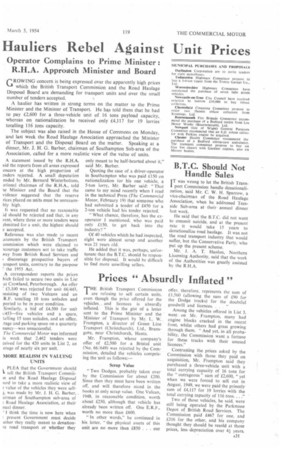Hauliers Rebel Against Unit Prices
Page 33

If you've noticed an error in this article please click here to report it so we can fix it.
Operator Complains to Prime Minister : R.H.A. Approach Minister and Board
GROWING concern is being expressed over the apparently high prices which the British Transport Commission and the Road Haulage Disposal Board are demanding for transport units and over the small number of tenders accepted.
A haulier has written in strong terms on the matter to the Prime Minister and the Minister of Transport. He has told them that he had to pay £2,600 for a three-vehicle unit of 16 tons payload capacity, whereas on nationalization he received only £4,117 for 19 lorries totalling 116 Ions capacity.
The subject was also raised in the House of Commons on Monday, and last week the Road Haulage Association approached the Minister of Transport and the Disposal Board on the matter. Speaking at a dinner, Mr. J. H. G. Barber, chairman of Southampton Sub-area of the Association, called for a more realistic view of the value of units.
A statement issued by the R.H.A. aid the reports from all areas expressed
oncern at the high proportion of anders rejected. A small deputation eadecl by Mr. Bernard Winterbottom,
ational chairman of the R.H.A., told le Minister and the Board that the vidence suggested that the reserve rices placed on units must be unreasonbly high.
It was requested that no reasonable id should be rejected and that, in any vent, where three or more tenders were Ibmitted for a unit, the highest should e accepted.
Reference was also made to recent Atements by the British Transport
ommission which were claimed to icourage customers not to take traffic
way from British Road Services and I discourage prospective buyers of ansport units, contrary to the purpose the 1953 Act.
A correspondent reports the prices hich failed to secure two units in List
at Crowland, Peterborough. An offer ! £3,100 was rejected for unit 66/443, 'misting of two Vulcans and an R.F. totalling 10 tons unladen and ported to be in poor condition.
Similarly, a bid of £4,500 for unit i,453—five vehicles and a spare, tailing 15 tons unladen, and an office, rage and parking space on a quarterly nancy—was unsuccessful.
The Commercial Motor was informed is week that 2,462 tenders were eeived for the 420 units in List 2, an crage of nearly six per unit.
MORE REALISM IN VALUING UNITS
PLEA that the Government should tell the British Transport Commisin and the Road Haulage Disposal 'aid to take a more realistic view of value of the vehicles they were sell4, was made by Mr. J. H. G. Barber, airman of Southampton sub-area of Road Haulage Association, at their nual dinner.
' I think the time is now here when present Government must decide ether they really meant to &nationEe road transport or whether they
only meant to he half-hearted about it," said Mr. Barber.
Quoting the case of a driver-operator in Southampton who was paid £150 on nationalization for his one vehicle, a 5-ton lorry, Mr. Barber said: " That came to my mind recently when I read in the technical Press (The Commercial Motor, February 19) that someone who had submitted a tender of £450 for a 2-ton vehicle had his tender rejected.
"What chance, therefore, has the exoperator I mentioned, who was paid only £150, to get back into the industry?"
Of 40 vehicles which he had inspected, eight were almost scrap and another was 21 years old.
He added that it was, perhaps, unfortunate that the B.T.C. should be responsible for disposal. It would be difficult to find more unwilling sellers.




































































































